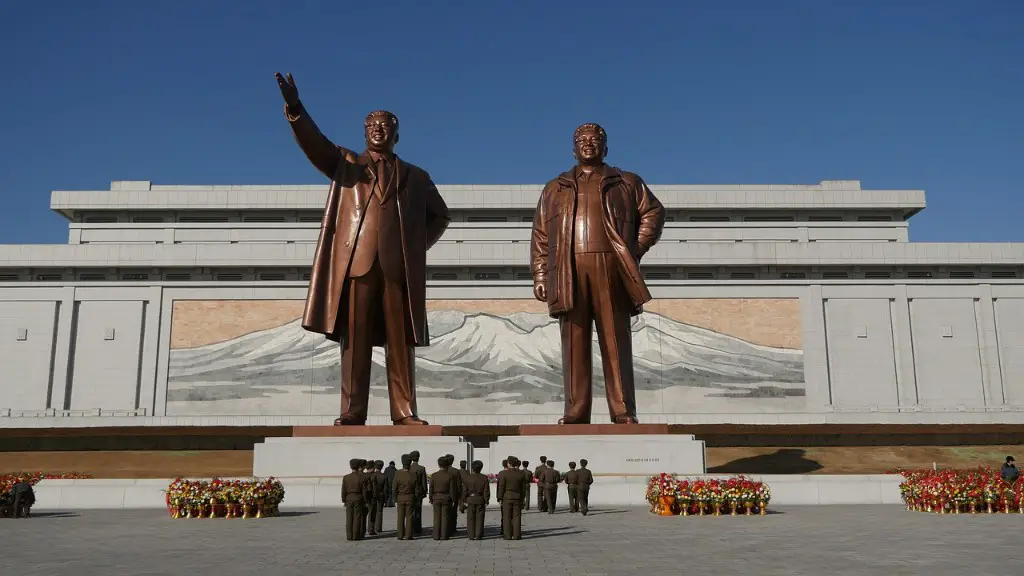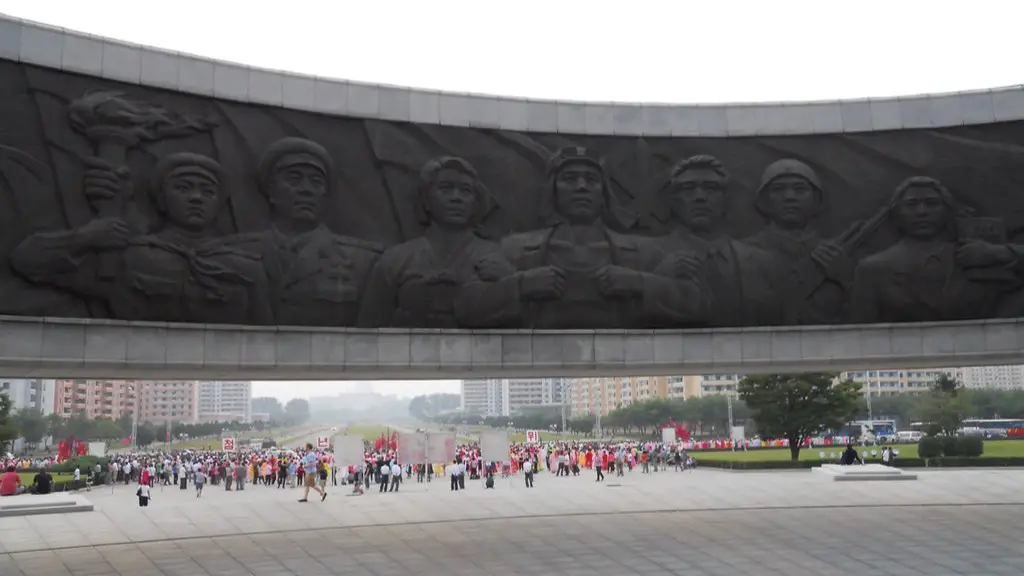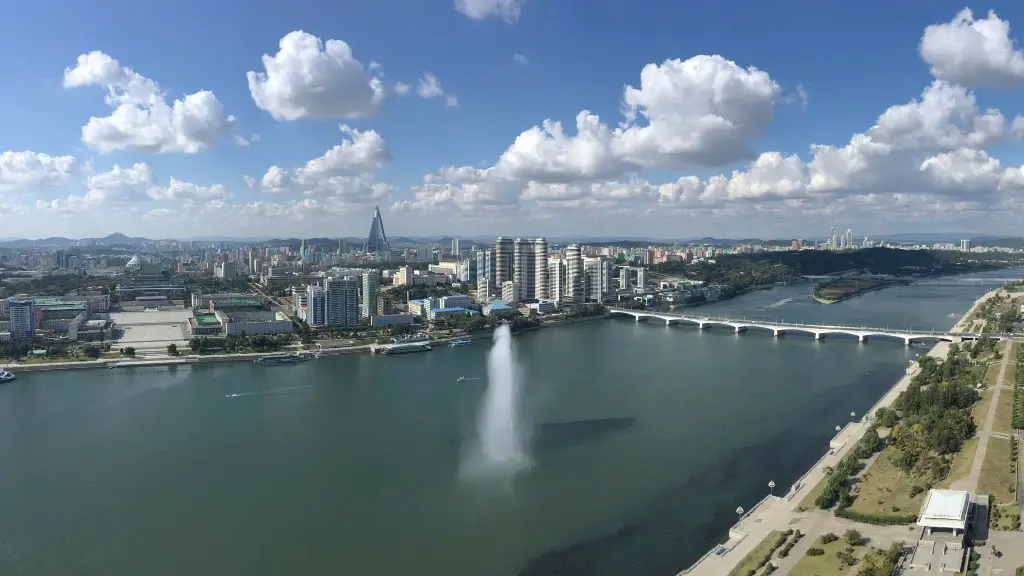Kim Jong-un, the controversial leader of North Korea, is one of the most mysterious figures in the world. He’s spent the last decade in power, yet there’s very little known about him. With the US and North Korea’s relations in its worst state since the Korean War, where is Kim now?
Kim was born on 8 January 1984 in Pyongyang, North Korea. Little is known about his early life. He was educated in Switzerland from the ages of 11 to 15, and then studied at Kim Il Sung Military University in Pyongyang. He has served as the Supreme Leader of the Democratic People’s Republic of Korea since the death of his father, Kim Jong-il, in 2011.
Since coming to power, he has been an enigma, rarely seen in public and rarely making comment. He has implemented a policy of isolation and mystery, as a way of maintaining his control. His direct contact with foreign officials is extremely limited. Analysts suspect he has kept himself out of the limelight in an effort to protect himself and his regime.
As a result, there is much speculation about his whereabouts. Northwestern University professor Bruce Bechtol believes Kim has been living mainly in the town of Samjiyon, near the border with China. He believes Kim is more likely to be in this area for “security reasons”. He notes that the town is further from North Korea’s principal missile test site, which could make it difficult for Western nations to target him in a potential attack.
However, others have speculated that he splits his time between different locations. Intelligence analyst Ki Choi suggests that he “may have changed places since the last days of his father’s rule”. In 2019, it was reported that he was spending time in the Chinese city of Dalian, where he met with Chinese leader Xi Jinping.
One thing is certain, though – Kim Jong-un is very much in control of North Korea. The so-called ‘Great Successor’ is consolidating his power and has taken on the role of both head of state and head of government in the country. His regime is known for its widespread human rights abuses and its development of nuclear weapons and other weapons of mass destruction.
Through his lies and authoritarian rule, Kim has established a reign of terror in North Korea. This reign has seen a rise in political repression, and ordinary North Koreans are often deprived of food, healthcare, and education. In 2019, a United Nations report estimated that nearly one-third of the North Korean population—nearly 10 million people—are in need of humanitarian aid.
Human Rights Abuses in North Korea
Kim Jong Un has been described as ruthless and uncompromising in terms of human rights. North Korea is among the world’s most repressive countries, allowing virtually no freedom of expression or association. Any perceived criticism of the government can result in torture, imprisonment, or even execution.
The UN Human Rights Council has documented cases of violations, including state-sponsored abductions, deprivation of the right to food, and forced labour. Amnesty International has suggested that the North Korean government has implemented a “shoot-to-kill system” to control citizens near the border area.
Defectors are also targeted by the regime. Hundreds of thousands of North Koreans have fled the country since the mid-1990s, mainly to China and South Korea. However, there have been reports that North Korean security forces have abducted those who have fled, and have forcibly returned them to the country.
The North Korean government has also been accused of carrying out extrajudicial killings. In 2014, the UN accused North Korea of perpetrating “systematic, widespread and gross human rights violations”. A 2016 UN report found evidence of torture, starvation, and “unspeakable atrocities” in North Korea’s political prison camps.
International Sanctions on North Korea
The international community has placed sanctions on North Korea as a way of deterring the country from pursuing its nuclear weapons program. These sanctions, primarily led by the United States, are targeted at restricting North Korea’s access to certain goods, materials, and technological resources that could help the regime.
The US has also placed secondary sanctions on companies, banks, and individuals who are known to do business with North Korea. In 2018, the US imposed additional sanctions following a series of missile tests conducted by the regime. It is estimated that these punitive measures have cost North Korea up to $2 billion in economic output.
Despite the sanctions, North Korea has continued to pursue its nuclear ambitions. By the end of 2017, the regime had conducted more than 20 missile tests and one nuclear test. In April 2017, it tested its first intercontinental ballistic missile, which experts believe could have the capability to reach the US mainland.
The international community has strongly condemned North Korea’s actions, and in December 2017, the UN Security Council unanimously adopted a resolution to ban oil, gas, and textile exports to the country. The resolution also called for the repatriation of all North Korean overseas workers, a move that would deprive the regime of an important source of revenue.
Reaction of the International Community
The US and other world leaders have condemned North Korea for its actions, and there have been numerous attempts to persuade Kim Jong Un to abandon his nuclear ambitions. The US President, Donald Trump, has sought to engage with North Korean leader, with the two leaders meeting three times since 2018.
The meetings have resulted in few concrete actions, with little progress made on the issue of North Korea’s denuclearization. Some analysts have argued that Trump has been too lenient in his negotiations with North Korea, while others suggest he has overestimated Pyongyang’s willingness to denuclearize.
The European Union also has sought to engage with North Korea in recent years. In 2018, the EU imposed its own sanctions on the country, which sought to restrict access to certain areas of the economy. However, the EU has also kept communication channels open with North Korea, engaging in diplomatic outreach.
Overall, the international community has failed to persuade North Korea to abandon its nuclear program in a decisive manner. Many experts have argued that the only way to prevent North Korea from becoming a nuclear power is through negotiations and diplomatic engagement.
Changes in North Korean Policies
Despite the international pressure and restrictive sanctions, recent months have seen some gradual changes to North Korean policies. In April 2018, Kim Jong Un declared that North Korea would shift from a policy of self-reliance to one of economic openness. This followed a period of rapprochement between North and South Korea and a warming of relations between Pyongyang and Washington.
In June 2018, North Korea agreed to dismantle a test site for its nuclear weapons program. This was seen as a significant sign of goodwill, and it was seen as further evidence that Kim Jong Un was committed to ending his country’s nuclear weapons program.
In recent months, there have been further signs of changes in North Korean policy. The country has allowed an increase in tourism and relaxed its visa requirements. It has also allowed foreign citizens to use mobile phones, enabling them to make international calls for the first time.
Kim Jong Un has also made steps to improve the country’s economy. In May 2018, North Korea released its first-ever economic development plan, which seeks to boost agriculture, light industry, and tourism by 2020. The plan also includes proposals to address infrastructure problems in rural areas.
Conclusion
Kim Jong Un remains an enigma to the international community. His regime has been built on secrecy and a policy of isolation, and his whereabouts remain unknown. However, it is clear that he is in control of North Korea, and that is unlikely to change soon. In recent months, there have been some signs of changes to North Korean policy, and the international community has sought to persuade Kim to abandon his nuclear ambitions. However, to this point, there has been no decisive progress in the negotiations.





